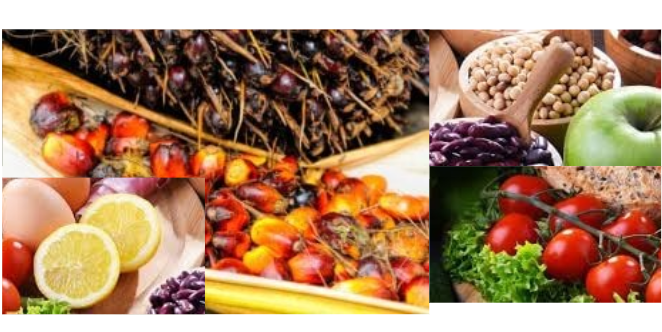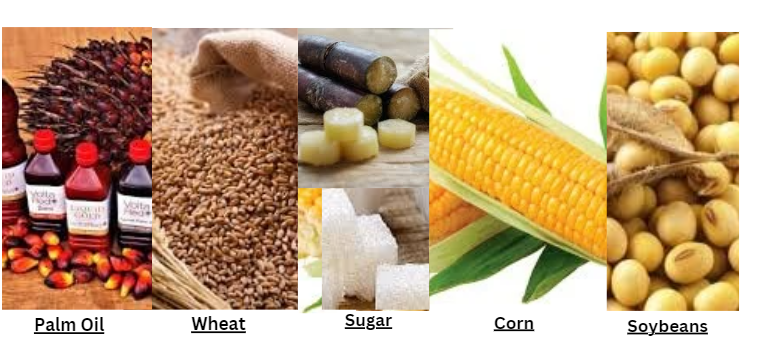
Exploring the World of Food Commodities in Ghana
Embarking on a journey into the heart of Ghana’s culinary landscape unveils a rich tapestry of food commodities that serve as the lifeblood of the nation’s agricultural sector. From the bustling markets of Accra to the fertile fields of the countryside, Ghana’s food commodities play a pivotal role in sustaining communities, driving economic growth, and preserving cultural traditions. Join us as we delve into the vibrant world of food commodities in Ghana, exploring their significance, diversity, and profound impact on both local livelihoods and global markets.
The Top 5 Food Commodities:
At the helm of the global food market are five key commodities: wheat, corn, soybeans, palm oil, and sugar. Each plays a vital role in sustaining populations worldwide and serves as a cornerstone of agricultural production and trade.
- Wheat: Wheat, revered as the king of grains, holds a prominent place on tables across continents. As a staple food for a significant portion of the world’s population, it forms the foundation of various culinary traditions. From the daily loaf of bread to beloved pasta dishes and hearty noodles, wheat is a versatile grain cherished for its nutritional value and culinary versatility.
- Corn: Corn, also known as maize in many areas of the world, is a widely grown crop with several applications. Corn, in addition to being a food staple, is used in a variety of goods such as cornmeal, corn flour, and corn syrup. Furthermore, it is an important component of animal feed, which benefits cattle businesses across the world.
- Soybeans: Soybeans, known for their high protein content, have become necessary in both human and animal diets. Soybeans may be found in a variety of foods, including tofu, soy milk, soy sauce, and vegetable oil. Furthermore, they provide critical nourishment for cattle, helping to produce meat and dairy products.
- Palm Oil: Palm oil, derived from the fruit of oil palm trees, is a versatile vegetable oil with diverse applications. Its inclusion in cooking oils, margarine, processed foods, cosmetics, and biofuels underscores its significance in various industries. Despite controversies surrounding its environmental impact, palm oil remains a crucial commodity on the global stage.
- Sugar: Sugar, the sweet essence of life, adds flavor and sweetness to countless culinary creations. Whether derived from sugarcane or sugar beets, it serves as a fundamental ingredient in desserts, beverages, and processed foods worldwide. Despite health concerns related to excessive consumption, sugar maintains its status as a beloved commodity in global markets.

Exploring a Bounty of Food Commodities:
Beyond the top five, a plethora of food commodities enriches the global marketplace, offering diversity and abundance to consumers worldwide. Let’s delve into the realm of these 20 essential commodities:
- Wheat
- Corn
- Soybeans
- Palm Oil
- Sugar
- Rice
- Coffee
- Cocoa
- Cotton
- Barley
- Oats
- Potatoes
- Tomatoes
- Bananas
- Apples
- Oranges
- Beef
- Pork
- Poultry (Chicken)
- Fish (Salmon)
From the sustenance provided by rice and potatoes to the indulgence offered by coffee and cocoa, each commodity brings its unique flavor and utility to the table. Whether consumed fresh, processed, or transformed into value-added products, these commodities form the backbone of agricultural economies and global trade networks.
Understanding Commodities:
In the realm of economics, commodities represent standardized goods that are interchangeable with other goods of the same type. Within the context of food, commodities such as wheat futures contracts serve as tradable assets on commodity exchanges, facilitating price discovery and risk management for market participants.
The Sources of Food Commodities:
The production and processing of food commodities stem from two primary sources:
- Agricultural Production: Farmers around the world engage in agricultural production, cultivating crops such as grains, oilseeds, fruits, vegetables, and raising livestock. Through their labor and dedication, they contribute to the abundance of food commodities available in global markets.
- Food Processing Industry: The food processing industry plays a pivotal role in transforming raw agricultural commodities into value-added products. From flour mills to sugar refineries and oil extraction plants, food processing facilities convert raw materials into consumer-ready goods, driving innovation and efficiency in the food supply chain.
Bottom lines
When exploring the world of food commodities in Ghana, we are reminded of the integral role they play in shaping the nation’s identity and livelihoods. As Ghana continues to navigate the challenges and opportunities of agricultural production and trade, let us recognize and celebrate the invaluable contribution of its food commodities in nourishing both body and soul, ensuring a brighter future for generations to come.






